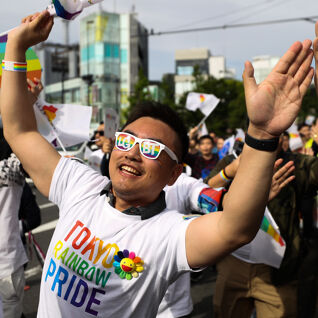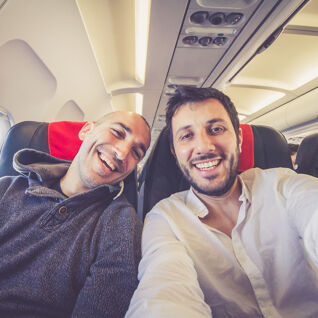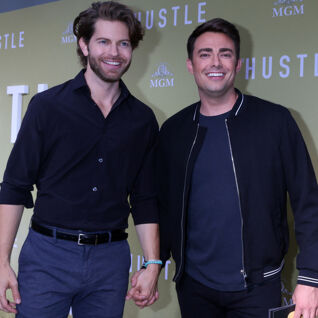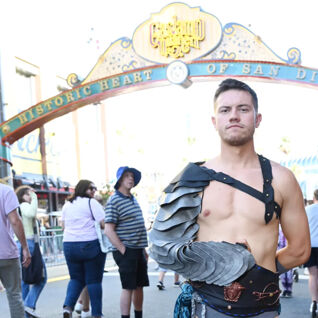When the 2020 Summer Olympics commence in Tokyo, Japan in July, there should be record-setting numbers of openly gay and trans athletes participating in the games—and if trans athletes compete, it would be the first time in the Games’ history.
According to records from Outsports.com, 56 athletes in the 2016 Olympics in Rio de Janeiro identified as openly gay or bisexual, although no athletes at the time identified as trans. Those numbers should greatly increase for the 2020 games, with several out athletes in contention for medals. Winning a medal is the dream of any Olympics athlete, but when openly gay and trans athletes compete at an international level, their participation opens the sports industry to greater inclusion for everyone.
Here are some of our favorite competitors to watch for during the 2020 Olympics:
Megan Rapinoe
The US Women’s National Soccer Team will begin their fight for a spot in the 2020 Summer Olympics in January 2020, when they compete in the Concacaf Olympic Qualifying Championships. But considering the team won the women’s World Cup in 2019, and is the highest-scoring women’s team in World Cup history, the U.S. is virtually assured a spot in Tokyo.
View this post on Instagram
This powerhouse U.S. team will be led by their charismatic midfielder, Megan Rapinoe, who dominated the field during the 2019 World Cup and scored multiple goals throughout the tournament, leading to her awards as Best Player and Top Scorer. A mix of bravada and the footwork to back it up, openly gay Rapinoe will undoubtedly be a sensation at the Tokyo Olympics in 2020, both on the field and in the Olympic Village with the other athletes. She will also be popular in front of news cameras, as she has a history of taking on critics, including President Trump, through the media.
Tom Daley
View this post on Instagram
Tom Daley has already competed three times in the Olympics, as a platform diver for Team GB, and he earned a bronze medal in both 2016 in Rio and 2012 in London. Although his most auspicious Olympics may have been Beijing in 2008, where he made his mark on the sport at the age of just 14 years old:
Now that he has grown up, Daley is just as famous for his athletic achievements as he is his social media presence, as he regularly shares details online of his personal life, including his marriage to filmmaker Dustin Lance Black. He certainly perpetuates the public’s interest as he posts numerous abs-flexing photos of himself on his Instagram account, much to the pleasure of his millions of followers.

The photogenic diver is a celebrity in his home country of England, although that has proven to be sometimes obtrusive. During the 2012 Olympics in London, the crowd took so many photos while he was diving, Daley exited the pool after a mediocre dive and complained to the judges that the flashes were distracting his efforts. The judges agreed, and awarded him a “redive” after scolding the crowd to put their phones away.
Daley performed better on that dive, and he earned the points necessary for his bronze medal, which led to critics claiming he earned his medal unfairly. But then in 2016 when he won another bronze, this time in synchronized platform diving, Daley silenced his critics and established his legacy as a top athlete.
CeCé Telfer
In just its 7th year of ff existence, the @FPURavensXCTF has its first national champion. Senior CeCé Telfer took control of the 400-meter hurdles on Sat. PM and went on to post victory w/ a personal best time of 57.53. Read more here; https://t.co/vCukMSb7vS pic.twitter.com/gE3v7HQ3Ml
— Franklin Pierce (@FPUniversity) May 26, 2019
The rights of trans athletes, who want to compete as their gender identity, is already emerging as the hot topic of the 2020 Olympics, as several trans women are within reach of qualifying for the games. One of these athletes is CeCé Telfer, a student athlete at Franklin Pierce University in New Hampshire, who won the Division II NCAA Women’s 400 meter hurdles. Her winning time of 57.53 seconds is not within range of winning a medal at the Olympics; in July 2019, American runner Dalilah Muhammad set the world record for the women’s 400m hurdles with a time of 52.20, and Muhammad also won the gold medal for the event in the 2016 Olympics. However, Telfer could still be a condender in the trials for the U.S. team.
Telfer has been the subject of much criticism for her participation in her sport as a woman, especially since she competed as a male up to January 2018. At issue is the role of testosterone in an athlete’s performance, and the fact that trans female athletes theoretically benefit from years of training with the testosterone levels of a male.
Telfer has addressed her critics by explaining how her hormone suppression treatments have been within the International Olympic Committee’s guidelines for female trans athletes, which require proof of testosterone suppression treatments for at least one year. “Being on hormone replacement therapy,” she said, “your muscle is deteriorating, you lose a lot of strength because testosterone is where you get a lot of your strength…I have to work twice as hard to keep that strength.”


















